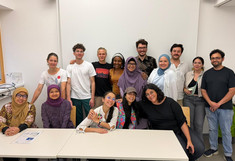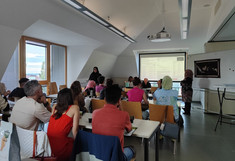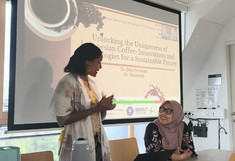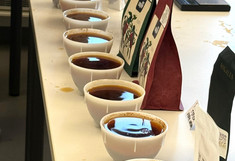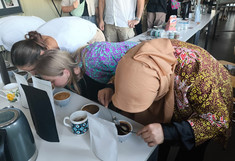4th Coffee Research Talk
4th Coffee Research Talk at BOKU University September 5-6, 2025
The 4th biennial Coffee Research Talk was held at BOKU University on September 5-6, turning the spotlight on Indonesia as a key coffee origin country. Organized by Xiomara F. Quiñones-Ruiz and her team at the Institute of Sustainable Economic Development, this year’s event, titled “From Soil to Cup: Decolonial, Technological, and Health Perspectives of Indonesian Coffees,” was held in close collaboration with colleagues from the Bogor Agricultural University (IPB University), Indonesia.
Over two days, approximately 50 on-site and online participants delved into the multifaceted dimensions of Indonesia's coffee sector. On Friday September 5th, the program began with Thierry Rostan (UNODC, Vienna) who discussed sustainable coffee development programs, followed by Rahmayania Fitri (PT Kay Beans Indonesia, online) presenting the key components, actors, institutions, and socio-economic challenges of the Indonesian coffee value chain. The discussion then broadened to international comparisons, with Skylar Lindsay (University of Bristol, online) sharing insights into practices and expertise in Vietnam’s specialty coffee industry. Dian Herawati and Saraswati (IPB University, Bogor) then presented innovations and technologies for building a sustainable future for Indonesian coffee. The day concluded with a critical reflection by Camila Khalifé (ConCafé, Ecuador) and Xiomara F. Quiñones-Ruiz (BOKU University), who framed a decolonial perspective that re-centered core values, transformative governance forms, and producer perspectives within global markets.
Saturday’s sessions (September 6th) highlighted field-level perspectives from various Indonesian coffee regions. The program started with Abyatar (Labuan Bajo, Flores), who presented the soil-to-cup trajectory of Adena Coffee. This was followed by Nicola Finardi, an Italian residing in Bajawa-Flores and serving as Co-Founder & Business Development Director of JYN Group Indonesia, who has been actively engaged in advancing sustainability discourses, especially about forest coffee as a model for resilient agroforestry-based production systems. The session further underscored the contribution of Maria Stefania Watu from ATA GAE Coffee, a female coffee producer from Bajawa whose work in specialty coffee exemplifies the role of women in strengthening local coffee economies. Subsequently, Eko Purnomowidodo (Java) outlined conservation initiatives undertaken by the Klasik Beans Cooperative, while Muhammad Firdaus and Yani Nurmayani (online) elaborated on the governance ecosystem of Liberica coffee in West Tanjung Jabung, Sumatra. The discussions concluded with Tejo Pramono (Bogor, Java), who emphasized the integrative role of specialty coffee shops in connecting smallholder producers with consumers and enhancing value chain inclusivity.
The program culminated in the launch of the Coffee Farmers Market (CFM) at BOKU, paired with an informal cupping session featuring coffees from Indonesia (Jambi, Gayo-Aceh, Bogor, Bajawa) alongside international roasteries, including El Vogal, Punto Rojo, Don Joaco, Nulldiebohne and Zalvera (Austria), Chicas Industry (Czech Republic), and Caventura (Germany). The CFM initiative aims to foster exchanges that build equitable partnerships by integrating market principles with non-market values such as reciprocity and redistribution.
Since its 2019 inception at BOKU, the Coffee Research Talk—organized by Xiomara F. Quiñones-Ruiz and her research network—has fostered critical dialogue across the coffee value chain. By building horizontal relationships and facilitating knowledge exchange between academic and non-academic audiences, the series cultivates the collaborations needed to develop creative solutions for the sector's environmental, social, and economic sustainability.

